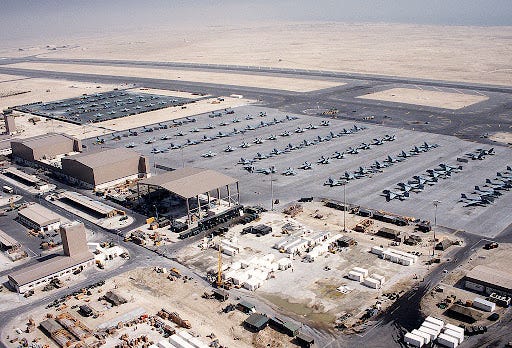The Pandemic taught the world many things - the most important the lengths governments go to abuse power and the people they’re meant to govern for.
Last week - three US soldiers were killed in Jordan at the infamous Tower 22.
The circumstances behind why they died remain murky.
So, should we believe the US Government’s version of events?
No, we shouldn’t.
The US Government lies consistently because that’s the DNA of US foreign policy.
Knowing that, the truth behind Tower 22 and how the soldiers died are vastly different to what the US is peddling.
What’s clear is the illustration of the contentious dynamics of US foreign policy and the events in Jordan, where alleged Iranian-backed forces killed the soldiers, again exposing America’s controversial military engagements in the Middle East.
The deaths not only mourn the loss of life but America’s ongoing occupation of foreign territories under contentious pretexts.
Tower 22 is at the north-eastern point of Jordan, close to Jordan's border with Syria and Iraq, and sits near the demilitarized zone with Iraq’s border 10 kilometres away.
It lays bare America’s tendencies that characterise its foreign policy.
The deaths occurred metres from Syrian territory - bypassing the legal complexity that would’ve limited US retaliation had the deaths happened within Syria.
What’s important is the geographical nuance highlighting a larger, insidious issue: America’s unauthorised control of 25% of Syrian territory since 2017.
Simply, America has been occupying Syria illegally for the past seven years - controlling it’s oil fields and vast resources.
America’s occupation is widely condemned as illegal and unprovoked - revealing the truth behind US foreign policy - and its pursuit of geopolitical dominance at any cost.
Washington’s neocons are obsessed with war - the US economy is powered by the military-industrial complex and the enormous profits it generates, especially for those in Congress who benefit from its prosperity.
It’s those same obsessed neocons who justify the US’s presence in Syria as combating ISIS and protecting regional interests.
Like anything the US is involved in – its motive is far more exploitative: commandeering Syrian oil fields, particularly around Deir ez-Zor, to deprive Syria of its natural resources.
The US’s strategy forms part of its "maximum pressure" campaign – to economically suffocate the Syrian government and maintain crippling embargoes which have brought significant suffering to Syrians.
Deploying US forces, in areas bordering Jordan and near Al Tanf, to fight ISIS, ironically facilitates a region where ISIS thrives exclusively in areas under US control.
This fascinating paradox raises questions about the true objectives of US military operations in the Middle East.
The US strikes provide a strategic opening for ISIS to mount attacks against Iraqi militias, particularly those associated with the People's Mobilisation Units (PMU), a coalition recognised by the Iraqi Ministry of Defence for their key role in combating ISIS.
America’s presence exacerbates existing tensions and disregards the sovereignty and stability of Syria and Iraq.
Repeated condemnations by Iraq’s parliament and the public, highlight the US’s military bogus intervention as unwanted.
Its presence the US says is a necessary deterrent against Iran and a crusade against ISIS, but the veil is thinner than the true intentions America is prepared to reveal.
Geopolitical ambitions, like serving Israel's strategic interests by weakening Syria and disrupting alliances or trade routes between Syria and Iraq that could benefit Iran.
America’s real intent is to destabilise Syrian President Bashar Al-Asaad and overthrow him, but there is little chance of that happening.
Al-Asaad enjoys significant public support.
Tower 22, and the pattern of America’s presence in the Middle East epitomises its disdain for the principles of sovereignty.
America’s behaviour is emblematic of a pernicious agenda - unilateralism, strategic dominance, and a disregard for the fallout of its actions.
Combating terrorism and countering hostile states is narrational ruse - a more complex reality where geopolitical manoeuvrings, resource control, and support for political agendas supersede genuine efforts to foster peace or uphold democracy.
America’s attitude to the Middle East reflects a broader agenda – its foreign policy driven by control and influence, while damning regional stability and the welfare of civilian populations.
The Tower 22 shootout highlights why US foreign policy needs to be rethought.
Genuine diplomatic engagement, respecting international law, and prioritising peace and stability over empire and resource exploitation is critical.
The death of the soldiers by supposed Iranian-backed forces serves as an indictment of US foreign policy in the Middle East continuing to go wrong.
It exposes the imperialistic underpinnings of America’s presence and its catastrophic impact on regional and global stability.
As the world continues to grapple with the repercussions of US foreign policy, profound transformation is urgent.
US policy needs to move away from the tyranny of military might towards a paradigm of respect for sovereignty, human rights, and international cooperation for the future of global peace and security.




